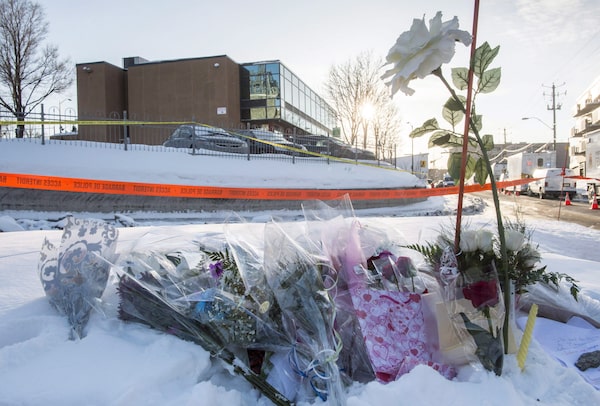Amira Elghawaby is a writer and human rights advocate based in Ottawa.

Flowers gathered near the Centre Culturel Islamique de Québec left six people died and eight others were injured two years ago.Paul Chiasson/The Canadian Press
Two years ago, a little girl in a purple tuque was standing in the wide, green expanse of the first floor of the Centre Culturel Islamique de Québec. Three more children were nearby as community members were milling about in conversation after completing evening prayers.
This was the quiet scene Alexandre Bissonnette walked into on the frigid night of Jan. 29, 2017. His gunshots shattered the calm, and within minutes six men were dead and several were severely injured. Soon, more than a dozen families, a religious community and an entire nation were confronted with the worst manifestations of hatred, bigotry, and Islamophobia.
Mr. Bissonnette pleaded guilty to several counts of murder and attempted murder and is scheduled to be sentenced next month. But as we mark the second anniversary, we are still missing closure.
It took two years for Khadija Thabti, widow of Aboubaker Thabti, to finally win financial compensation from the provincial victims’ compensation board – only granted abruptly late last week. The mother of two, who hasn’t been able to work and still has nightmares, was otherwise scheduled to appeal her case in court on Jan. 29, of all days. While it must be a relief that she now won’t have to, what about other families – who had only two years from the timing of the tragedy to make a claim?
Jan. 29 this year is also the deadline for Quebecers to register their firearms in a public registry. Many in Quebec City’s Muslim community have welcomed this move, though they remain justifiably concerned that gaps that permitted someone with a history of mental illness like Mr. Bissonnette to obtain and hold on to weapons will remain.
In the meantime, the federal government is also in the midst of updating firearms regulations, but nagging concerns about screening persist nationally as well, including whether those who publicly exhibit racist, extremist views can be prevented from purchasing guns.
Then there’s the reality that minority communities in Canada are increasingly targets of hate; the year of the massacre saw a 151 per cent rise in hate crimes targeting the Muslim community. Just this past week, worshippers arriving for Friday prayers at Al Rashid mosque in Edmonton were confronted by two men allegedly belonging to an anti-Muslim hate group. One of them was wearing a hat emblazoned with the word ‘Infidel’, a clear hint he wasn’t simply there to use the bathroom, as he later claimed on Facebook, but to intimidate the community at a particularly anxious time.
Among the growing number of far-right, anti-immigrant groups in Canada, there is the newly formed yellow vests movement, modelled after the French protest group. The original message has been appropriated by those holding racist, anti-immigrant views, according to Canada’s ambassador to France.
Yellow vest protesters now frequently rally across the country, ostensibly against the government’s economic and immigration policies. Yet anti-Muslim and anti-immigrant posters and flyers distributed at various events point to dangerous views. Even the group’s Facebook page, with 100,000 members, has included a variety of racist comments, even death threats against the Prime Minister.
Two years on, this country still has no clear strategy for addressing online hate. We know now that Mr. Bissonnette was consuming Islamophobic and anti-immigrant rhetoric spewed by a coterie of online propagandists. And while a parliamentary committee recommended increased funding for law enforcement to investigate online hate speech, we’re still waiting for concrete action.
One can find solace in the acts of kindness offered by individuals and communities during these past two years. The hundreds of thousands of dollars raised to purchase a house for Aymen Derbali and his family are a reminder that many people do want to help. Mr. Derbali, who was paralyzed in the shooting, hasn’t let the attack shake his faith in his fellow Canadians.
He deserves to be commemorated as a hero, along with the other men who selflessly ran toward the gunman that night in an effort to stop the rampage and who lost their lives or were severely injured in doing so. Their sacrifices should further compel us to do more to honour their legacy, and to help bring about closure to this national tragedy.
Editor’s note: Canada’s ambassador to France stated that the original message of the yellow vest movement has been appropriated by the far-right. An earlier version of column incorrectly attributed this to France’s ambassador to Canada. In addition, the year of the mosque massacre saw a 151 per cent rise in hate crimes targeting the Muslim community. An earlier version of this column stated that number was 50 per cent.